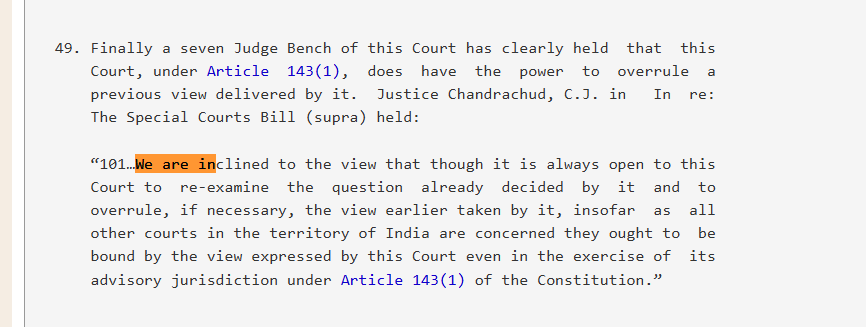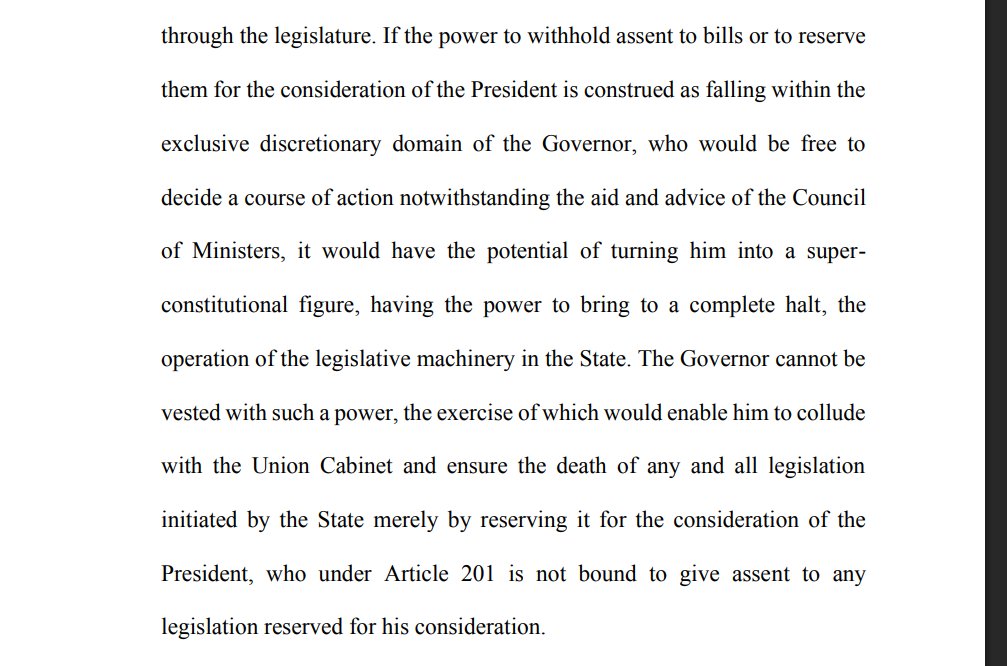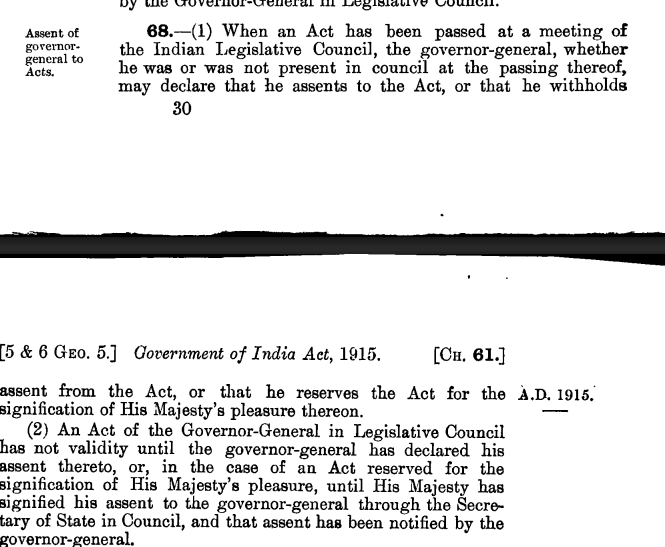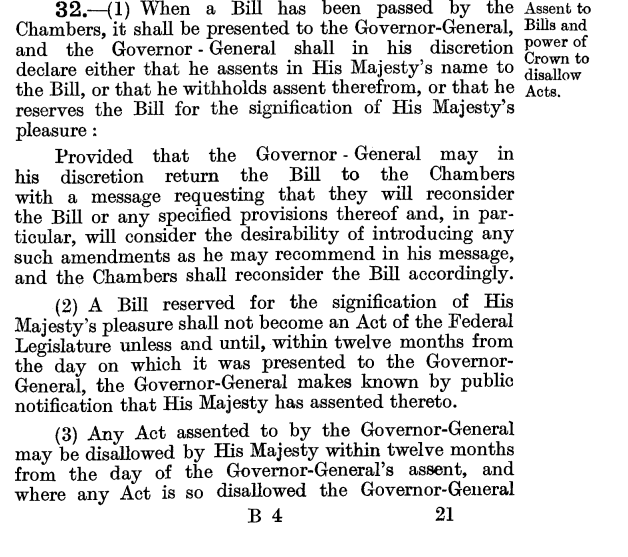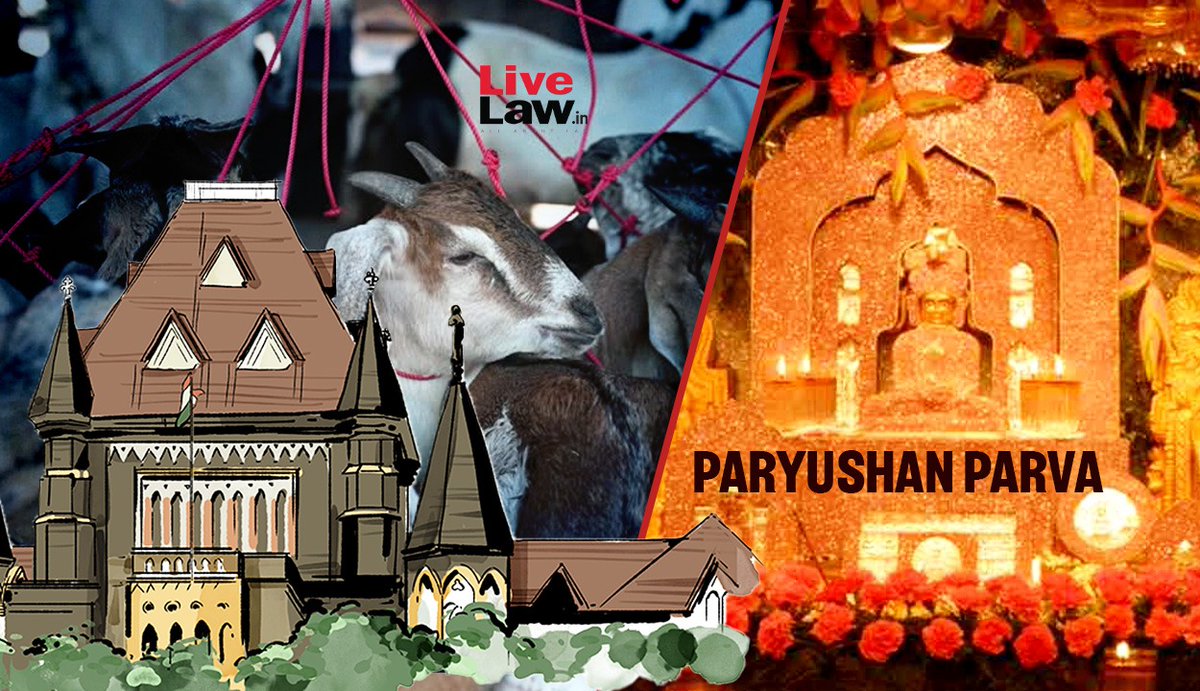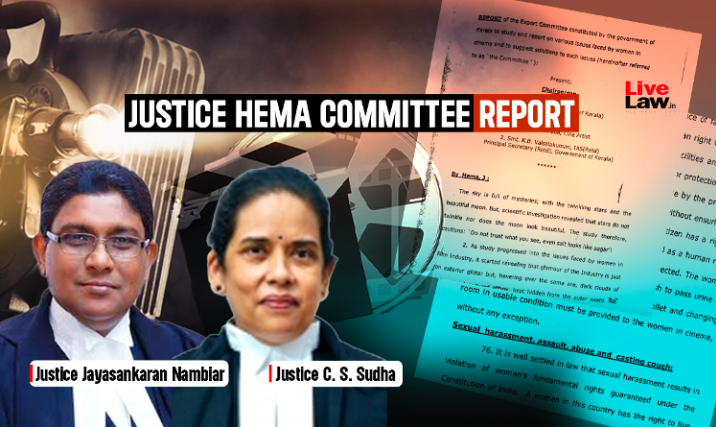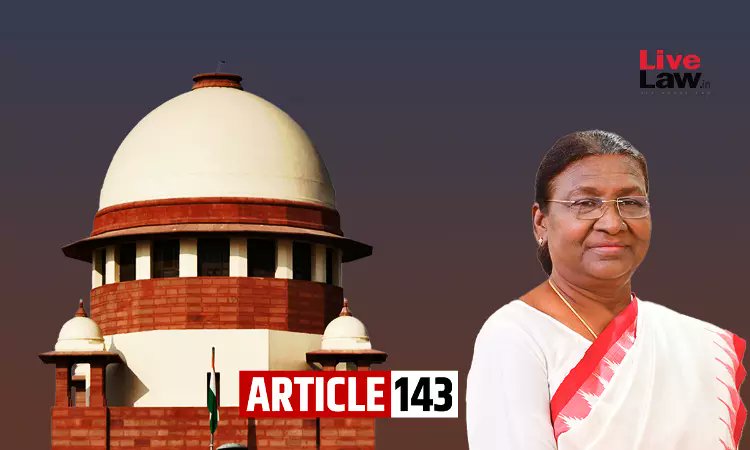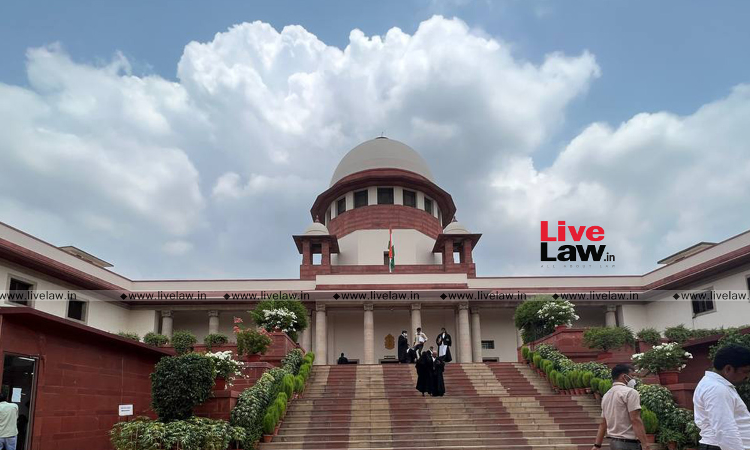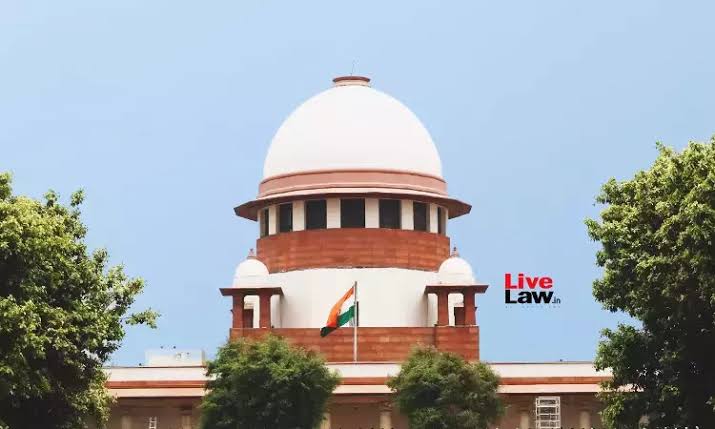#SupremeCourt constitution bench to hear today Presidential Reference by President Droupadi Murmu (@rashtrapatibhvn) on 14 questions on the power to assent on Bills, including whether Court can fix timelines for the President/Governor to decide on Bills. 
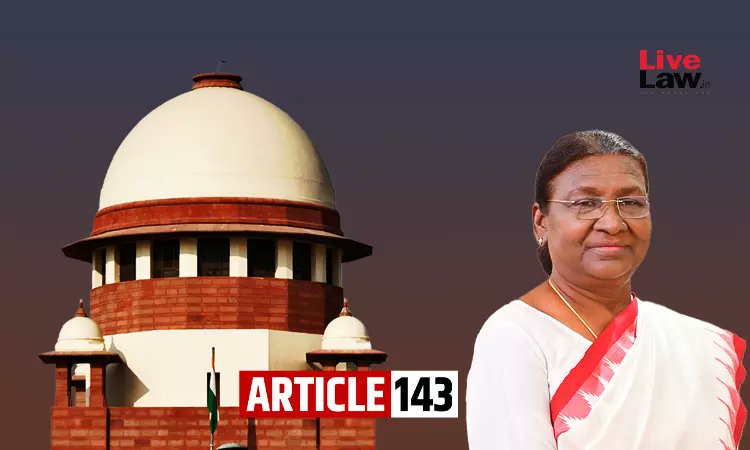
The Presidential Reference, made under Article 143, came a month after Supreme Court's judgment in Tamil Nadu Governor's matter, wherein the Court held that the Governor did not act bona fide in reserving Bills to President. It held those bills as deemed assented: livelaw.in/top-stories/su…
@rashtrapatibhvn In the judgment passed by Justices JB Pardiwala and R Mahadevan, the Court held that the President must act on the Bills reserved for her under Article 201 within 3 months: livelaw.in/top-stories/pr…
@rashtrapatibhvn Here is the 14 questions asked by President Murmu:
livelaw.in/top-stories/su…
livelaw.in/top-stories/su…
@rashtrapatibhvn A Presidential Reference is heard by a constitution bench and therefore, a five-judge bench: 
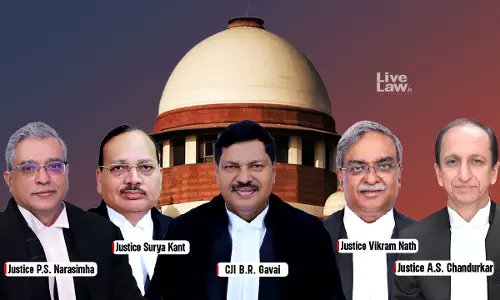
@rashtrapatibhvn Court will hear State of Kerala and the State of Tamil Nadu on preliminary objections. They have argued that the Tamil Nadu judgment covers most questions raised in the Presidential Reference.
@rashtrapatibhvn Senior Advocates Kapil Sibal, Abhishek Manu Singhvi, KK Venugopal, P Wilson, Gopal Subramaniam, Gopal Sankarnarayan, Attorney General R. Venkataramani and Solicitor General Tushar Mehta to appear.
@rashtrapatibhvn Bench assembles.
@rashtrapatibhvn AG: Since in terms of Supreme Court rules, the notice is issued to Attorney General and I thought, I will make some introductory remarks
CJI: They are raising preliminary objections
CJI: They are raising preliminary objections
@rashtrapatibhvn CJI: we will hear them for half and hour, and then it will begin with your opening [to AG]
Wilson: mylords may hear Tamil Nadu as well
Wilson: mylords may hear Tamil Nadu as well
@rashtrapatibhvn Venugopal: the issue is covered by a series of judgments and if mylords are please to take reference itself, which is at vol. 3, page 5 [reads the reference]
livelaw.in/top-stories/pr…
livelaw.in/top-stories/pr…
Venugopal: this may not be quite correct, both in Telengana and Punjab and Tamil Nadu, the question of 'as soon as possible' under Article 200 has been interpreted and in Tamil Nadu, the timeline has been fixed.
CJI: Tamil Nadu is judgment by two learned judges?
Venugopal: one is not reported
CJI: Tamil Nadu is judgment by two learned judges?
Venugopal: one is not reported
@rashtrapatibhvn Venugopal: second is the Punjab case-livelaw.in/supreme-court/…
Venugopal: continues to read the reference- the three judgment, Punjab, Telangana and Tamil Nadu, have decided this issue
CJI: What about 143(3)?
Venugopal: most of judgments are by five judges
CJI: judgments you are relying, is it five judges?
Venugopal: no, three and two judges
CJI: What about 143(3)?
Venugopal: most of judgments are by five judges
CJI: judgments you are relying, is it five judges?
Venugopal: no, three and two judges
Venugopal: the question of five judges would arise if substantial question of law arises and party asks
CJI: when the hon'ble President is asking, what is wrong?
Venugopal: the AG appearing in Telangana did not say it was Article 143(5)
CJI: Are you really serious on preliminary objections, just let us on Article 143(5)
CJI: when the hon'ble President is asking, what is wrong?
Venugopal: the AG appearing in Telangana did not say it was Article 143(5)
CJI: Are you really serious on preliminary objections, just let us on Article 143(5)
@rashtrapatibhvn Venugopal: what is the option to the Governor when Bill is presented to him under Article 200, this query is answered in Tamil Nadu
CJI: learned AG says matter should go to Article 145(3)*
correction- Article 145(3) is being referred
CJI: learned AG says matter should go to Article 145(3)*
correction- Article 145(3) is being referred
@rashtrapatibhvn Venugopal: if substantial question of law has been raised, no where in the entire judgment..
CJI: judgment is specifically record that he asked for reference, it was not considered is it his mistake?
CJI: judgment is specifically record that he asked for reference, it was not considered is it his mistake?
CJI: Can you formulate your objections, Mr Venugopal
SG Mehta refers to the objections made by the AG that the matter may be referred to a larger bench
Venugopal: what he has raised in clause L...he never raised it
CJI: Solicitor General may not have referred to Article 145(3) speficially, but he said it needs to be referred to larger bench
SG Mehta refers to the objections made by the AG that the matter may be referred to a larger bench
Venugopal: what he has raised in clause L...he never raised it
CJI: Solicitor General may not have referred to Article 145(3) speficially, but he said it needs to be referred to larger bench
Venugopal: please see queries 1 to 11, each covered by Tamil Nadu case directly. Once a judgment covers these issues, these issues are no more res integra. The judgments in natural resources, kaveri and Gujarat assembly has said that if issues have been decided, no reference can be raised.
If issues are to be decided in Article 143, mylords are equally bound under Article 141
CJI: five judges bound by two judges?
Venugopal: unless mylords overrules it
If issues are to be decided in Article 143, mylords are equally bound under Article 141
CJI: five judges bound by two judges?
Venugopal: unless mylords overrules it
Venugopal: Supreme Court is being asked to sit on judgments which is already decided...This wholly outside Article 143 because mylords can't touch judgment in Article 143 which has been decided.
Nowhere in reference, Tamil Nadu case referred to and reference is sought within days without seeking review. According to me, Government of India was bound to seek review. So far, President under Article 74 is bound by aid and advice and no area of discretion is left. The president has to carry out whatever advise given by Council of Ministers. In substance and effect, this reference is by Government of India. Please reference, its an attempt by GOI without filling review.
Nowhere in reference, Tamil Nadu case referred to and reference is sought within days without seeking review. According to me, Government of India was bound to seek review. So far, President under Article 74 is bound by aid and advice and no area of discretion is left. The president has to carry out whatever advise given by Council of Ministers. In substance and effect, this reference is by Government of India. Please reference, its an attempt by GOI without filling review.
@rashtrapatibhvn Venugopal: A judgment of Supreme Court is law under Article 141. They are bound by the law laid down but Article 143 is only an opinion.
@rashtrapatibhvn Singhvi, for Tamil Nadu: first, the only state that went to the division bench. I succeeded.
1. No intra-court appeal is allowed
2. advisory can't be a substitute for review
3. Article 143 not substitute for hurra and curative
1. No intra-court appeal is allowed
2. advisory can't be a substitute for review
3. Article 143 not substitute for hurra and curative
every issue barring 11 and 12, and 14, everything is directly covered. 11, 12 and 14 does not arise because 11 is not a standalone and others are peripheral issue.
Kaveri is in my favour, my learned friends rely on 2G
If bench decides the matter and chooses not to reference, then in appropriate subsequent case and unrelated, in a matter between c and d, mylords may not refer.
Kaveri is in my favour, my learned friends rely on 2G
If bench decides the matter and chooses not to reference, then in appropriate subsequent case and unrelated, in a matter between c and d, mylords may not refer.
Singhvi: another nuance, 2G says you can have different view on law, in c v d case, law my change and same 2G mentions will not change the list. In the present case, it mylords allow advisory, mylords can't give a judgment. That is a and b, tamil nadu, stands as it is, and for rest of country, the law could be c and d. The decision 2G, kaveri, the view can't change.
Singhvi: come to Kaveri judgment. yourlords is being asked to change the merits and contents of the decision in a and b in a subsequent decision. Purely appellate however nicely you couch it, very serious subversion of supreme court integrity. In appropriate case, mylords may refer but law will not change for the two parties, entire concept of stare decises will be completely subverted.
@rashtrapatibhvn J Kant: where is question formulated that a particular judgment is set aside, we know kaveri and 2G, we are here in Article 143
J Narasimha: the adjudicatory decision stands in completely footing than advisory
J Narasimha: the adjudicatory decision stands in completely footing than advisory
Singhvi: the decision can't be changed, the view can be changed, the naunce in 2G. Mylords J Kant says we won't be touching the case, but the law and case is infused. All questions if answered other than the division bench answered will constitute a change of law and also for the decided case of tamil nadu.
CJI: Are your argument is to accept it?
CJI: Are your argument is to accept it?
@rashtrapatibhvn J Kant: its purely advisory
Singhvi: once Article 143 is delivered, because mylords is the Supreme Court, i can't disregarded
J Kant: purely advisory, it may or may not be accepted
Singhvi: once Article 143 is delivered, because mylords is the Supreme Court, i can't disregarded
J Kant: purely advisory, it may or may not be accepted
Singhvi: your lordships under Article 143 is binding, a matter is referred, the law will change for future. Suppose, in appropriate matter, it is referred..otherwise kindly consider advisiory jurisdiction, it becomes intra-court appeals
J Nath: this is not right, you are presuming we will null the two judge judgment
CJI: show us one judgment where in a division bench, a reference is not tenable. We are not deciding the issue whether tamil nadu is correct or not
Singhvi: in the event, the answers is not consistent
CJI: we are not concerned with that
J Nath: this is not right, you are presuming we will null the two judge judgment
CJI: show us one judgment where in a division bench, a reference is not tenable. We are not deciding the issue whether tamil nadu is correct or not
Singhvi: in the event, the answers is not consistent
CJI: we are not concerned with that
@rashtrapatibhvn Singhvi: refers to a judgment where central government made a reference to the tribunal where an issue was related to a judgment of the court
@rashtrapatibhvn Singhvi says a reference can only be made when the issues have not been decided.
@rashtrapatibhvn Singhvi says appellate jurisdiction is not vested in the supreme court in Article 143.
@rashtrapatibhvn Singhvi: indirect endeavour to overturn 2G
@rashtrapatibhvn Singhvi: Kaveri is cited to say that there is no intent in 2G to overturn Kaveri.
View of law v decision of the law- heart of the nuance. Please apply nuance, but not in this case. This is my submission.
View of law v decision of the law- heart of the nuance. Please apply nuance, but not in this case. This is my submission.
CJI: we are expressing view of law and not decision in Tamil Nadu
Singhvi: unlike in 2G, where issue in earlier bench was auction
CJI: it is specifically answered in para 65.
Singhvi: if you say per incuriam, burden lies with the State. Please see conclusion in Kaveri, the problem is
CJI: not necessary to read all paras marked by your junior
Singhvi: I am not reading half of it.
Singhvi: unlike in 2G, where issue in earlier bench was auction
CJI: it is specifically answered in para 65.
Singhvi: if you say per incuriam, burden lies with the State. Please see conclusion in Kaveri, the problem is
CJI: not necessary to read all paras marked by your junior
Singhvi: I am not reading half of it.
Singhvi: the problem is in my case, if it differs with the last judgment, it will disturb the law unlike in the other case where the law was implemented. If mylords can find a way to not disturb the tamil nadu, I have no problem
J Narasimha: what followed in this case has happened, it is an opinion. In subsequent case, if you refer an opinion and ask the court to take different decision, the argument was it can't be relied because it was an opinion
J Narasimha: what followed in this case has happened, it is an opinion. In subsequent case, if you refer an opinion and ask the court to take different decision, the argument was it can't be relied because it was an opinion
@rashtrapatibhvn Sibal: we made reference in 2G, what happened was, principle in 2G was natural resources must be auctioned. the question arose should all natural resources be auctioned? will it follow the principle of law that all will be c, just the history context
@rashtrapatibhvn AG: there are judgments of larger benches dealt with Article 201, but judgment does not entirely record Article 145(3) argument of mine
@rashtrapatibhvn AG: reads the argument for reference to the five judge bench in Tamil Nadu hearing.
AG: the 2G brought in imp perspective, I understand Article 143 is not comparable to other Articles because it is the authority of the President. Others are jurisdiction conferred to the court. President is the master of the Article 143, and the Court may go into the previous judgments, there is no threshold or limitation that the court can't go into. There has been 15 references, the court has gone into previous judgments, it may agree or disagree.
@rashtrapatibhvn AG: It is hold there is no demarcation or lines are blurry, it is not true. In a given case of public important, court can say we depart from the practice and we will look into questions including old precedent.
@rashtrapatibhvn AG: I would say, given the important of Article 143, the Court can depart from earlier precedents, there is nothing that inflexible rule. If that is the case, Article 143 will completely lose its essence.
@rashtrapatibhvn AG: decision of law v view of law, in a Article 143 reference, the court does not enter into merits. We want to assist, the Court will not say we heard on maintainability.
@rashtrapatibhvn J Kant: it is not foundational principle under Article 143, when it talks about law as reason, the question of law will be governed for the one which has not been answered.
@rashtrapatibhvn AG: even if field occupied by a particular judgment, on a question of law, if there is no authoritative or conclusion pronoucement
J Narasimha: to go into the question if there is conclusive authority is the issue
J Narasimha: to go into the question if there is conclusive authority is the issue
@rashtrapatibhvn AG: there are so many judgments, which is the correct law? I am not saying you review ordinarily...
@rashtrapatibhvn AG: if mylords look at Tamil Nadu and Punjab, the line can be completely drawn. We are talking about state v view of law. I am saying, you can't say the doors are closed as per 2G judgment, because as and when President says the issues are of public importance
AG: Article 143 reference is suis generis, whatever President thinks is advisable, there is no particular form. President's hands are not tied. Even if the field is occupied, the court can enter and agree with any of the judgment [on Venugopal saying tamil nadu judgment not referred in reference]
AG: Article 143 reference is suis generis, whatever President thinks is advisable, there is no particular form. President's hands are not tied. Even if the field is occupied, the court can enter and agree with any of the judgment [on Venugopal sTamil nadu judgmment no referred in reference]
AG: Article 143 reference is suis generis, whatever President thinks is advisable, there is no particular form. President's hands are not tied. Even if the field is occupied, the court can enter and agree with any of the judgment [on Venugopal sTamil nadu judgmment no referred in reference]
SG: Article 143-question of law arisen and likely to arise. I will read few paras of 2G. There are in all 15 reference, all were with regard to a particular issue. This is for the first time, the President felt functional disharmony arisen and will arise because no authoritative pronoucement because two bench fixes timeline for another authority. There is constitutional functional problem- how governor and President would act.
SG: two distinctive factors in 2G, one of the questions was whether judgment of two judges lays down correct law- it was an appeal, the principal argument was with respect to maintainability. Now, in this context, in judgment in 2G, please bare in mind, mylords don't generally go into judgment already decided not as jurisdictional issue but it is a self-imposed restriction under advisiory jurisdiction but in 2G, mylords said even that is permissible.
@rashtrapatibhvn SG says overruling is a consequence of inherent powers and not appellate powers.
@rashtrapatibhvn SG: highest head of executive is seeking guidance, the judgments of five, three, and two have created constitutional problem
J Narasimha: you can't expect supreme court...
SG: Am I bound to intimate everybody? I am bound by timeline?
J Narasimha: you can't expect supreme court...
SG: Am I bound to intimate everybody? I am bound by timeline?
@rashtrapatibhvn SG: Could the bench of that strength decide the question when reference to five was asked
J Kant: we are in advisory jurisdiction, we are not in appellate. In Article 143, we will answer that. The court can render an opinion that a certain judgment does not lay down correct law but it will not overrule the judgment.
SG: in 2G and cauvery, in answering reference, mylords can overrule
SG: in 2G and cauvery, in answering reference, mylords can overrule
@rashtrapatibhvn SG: Keshav Singh judgment, there was some privilege issue, a reference was made and court overruled that the judgment does not lay correct rule.
@rashtrapatibhvn Senior Advocate: a view of law is not eternal and mallible and is subject to overruling, that is why in seven judge said it can be overruled not in appellate jurisdiction but the inherent powers.
@rashtrapatibhvn Snr Adv: President opinion is held to be non-justiciable on issue of whether question arises is of public importance and it needs
J Kant: Article 143(1), first we will determine if there is a constitutional question of law or it arises to be answered
J Kant: Article 143(1), first we will determine if there is a constitutional question of law or it arises to be answered
Snr Adv, for Madhya Pradesh: All I said, whether there is satisfaction of the President, whether mylords answers it or not is different.
Snr Adv Harish Salve: it is not jurisdictional power, self imposed power. Maintainability is used losely. Doctrine of precedent is self imposed. Article 141 does not bind the supreme court overrule. Singhvi, first said, stare decis, it never stood in a way. Decree will continue to bind until set aside. What is happening, these challenges, it puts cart before the horse because mylords have not even engaged with these questions. It has happened that on many issues, the courts have spoken in different voices, mylords can deal and say but this is not maintainability.
Snr Adv Harish Salve: it is not jurisdictional power, self imposed power. Maintainability is used losely. Doctrine of precedent is self imposed. Article 141 does not bind the supreme court overrule. Singhvi, first said, stare decis, it never stood in a way. Decree will continue to bind until set aside. What is happening, these challenges, it puts cart before the horse because mylords have not even engaged with these questions. It has happened that on many issues, the courts have spoken in different voices, mylords can deal and say but this is not maintainability.
@rashtrapatibhvn Snr Adv Maninder Singh: if ex-facie it appears there is no consistency in the views, it is entirely permissible for the President to resort to Article 143, especially on applicability on constitutional provisions.
@rashtrapatibhvn AG: I have settled 5 broad proposition. The series of questions placed have certain intrinsic connections. Article 200 and 201, in company of other provisions, occupy special scheme. Its like a fulcurm where president and governor plays role of guardian for integrity
@rashtrapatibhvn AG: Why need Articles 200 and 201 when legislature have final say? if in course of any political reasons, argument is canvassed, look it in particular way, it will be democratic. I hope court will look at it keeping in mind the constitutional importance.
AG: The debates on discharge of function between governor and state, the functional assignment is important. its the running blood with infuses in the functioning of Article 200. In course of exchange of views between Governor and State, in Tamil nadu judgment, it says, we will resolve and provide answers. Read Articles 200 and 201 as it is and in Tamil Nadu judgment, the court entered into a legislative exercise.
@rashtrapatibhvn AG: Article 200 and 201 are a part of basic structure, to ensure that non-constitutional compliance, the President and Governor will say, stop! but tamil nadu judgment diluted.
@rashtrapatibhvn AG: in tune with range of opinion, it is open for the court to decide what is the correct law? Tamil Nadu judgment is a departure from previous judgments. There is a mandate for the President to seek opinion if the Governor should have reserved the bill or not.
AG: 1 and 2 propositions related to maintainability, proposition 3, the doctrine of separation of powers injuncts the court what only legislature can do. Tamil Nadu judgment substantially rewritten Article 200 and 201, and whether it wil be against separation of powers is a matter of public importance
CJI: this court encroached upon legislative powers or sought to re-write the constitution, that's your main submission?
AG: it is a matter of textual amendment to the constitution. In guise of interpretation, can court go to the extent in saying I will take pen and paper and rewrite the constitution?
AG: it is a matter of textual amendment to the constitution. In guise of interpretation, can court go to the extent in saying I will take pen and paper and rewrite the constitution?
@rashtrapatibhvn AG: In Kerala written submission, the Presidential reference is not adverted. I don't propose to go into proposition 4. What we are seeking is that the state/view of law.
AG: Article 145(3), is it mandatory for the bench of supreme court to decide if the question involves substantial question of constitutional interpretation and that it should be referred to five judges
CJI: if you go through this exercise on Monday and Friday, we will have to sit till 12 at night
CJI: if you go through this exercise on Monday and Friday, we will have to sit till 12 at night
@rashtrapatibhvn CJI: whenever any question involving question of law
AG: substantial question of law
J Narasimha: it is a broad contour, its not mandatory. But why does we answer this court?
AG: substantial question of law
J Narasimha: it is a broad contour, its not mandatory. But why does we answer this court?
@rashtrapatibhvn AG: there are judgments of five judges, if you disagree, it has to go to five judges. We are trying to point out, if its an issue of constitutional importance, in those categories for working of the constitution and its integrity, Article 145(3) imposes a mandate.
@rashtrapatibhvn AG: If court were to say, notwithstanding the question of constitional importance, a two judge bench can decide, it will be directly contrary to Article 145(3)
AG: Court exercise original and appellate juridiction, in that context if court finds importance questions of substantial importance, to interpret the provisions of constitution. Therefore, the daily stuff Article 14 and 21 is different. We are talking about very special class of provisions
J Narasimha: the moment substantial question is referred, the court will have to refer it to five?
AG: 2G talks about if there is conclusive authority, that is different but if there is contrary views, the court will say I am duty bound to refer; its a high responsibility. The moment court enters a field occupied by different judgments...
J Narasimha: you should not ask it in advisory jurisdiction. You should ask in regular
AG: We have Tamil Nadu judgment where in breach of Article 145(3), the court answered questions. It is important for the President to know
J Narasimha: the moment substantial question is referred, the court will have to refer it to five?
AG: 2G talks about if there is conclusive authority, that is different but if there is contrary views, the court will say I am duty bound to refer; its a high responsibility. The moment court enters a field occupied by different judgments...
J Narasimha: you should not ask it in advisory jurisdiction. You should ask in regular
AG: We have Tamil Nadu judgment where in breach of Article 145(3), the court answered questions. It is important for the President to know
@rashtrapatibhvn AG says if questions of law have been decided by conclusive authority, then that would not be substantial question of law. But if there are several conclusive authorities such as two or three judges bench, a conclusive authority is needed.
@rashtrapatibhvn AG: Tamil Nadu judgment proceeds to say Governor is bound by aid and advice, but if bill is not constitutionally compliant, where is the question of withholding assent or seeking aid and advice
@rashtrapatibhvn AG: in breach of article 145(3), it is a matter of constitutional concern. It is become important to raise this consideration that no two views of that question, that in absence of conclusive authority, it will not only be prudent to go through the route of Article 145(3)
AG next argument is how Article 200 stood before Tamil Nadu judgment.
SG: AG is addressing as Attorney General and I would be answering for Union of India.
AG: [reads how Article 200 stands after TN judgment] when bill is passed by legislative assembly, the Governor shall within a month, on aid and advice...
SG: AG is addressing as Attorney General and I would be answering for Union of India.
AG: [reads how Article 200 stands after TN judgment] when bill is passed by legislative assembly, the Governor shall within a month, on aid and advice...
@rashtrapatibhvn AG: So you see, the scene is entirely different from what is envisaged. We will look into if aid and advice will bind with the bill is so unconstitutional, all that flows from textual amendment to Article 200.
@rashtrapatibhvn CJI: According to you, last proviso is also added to Article 200; a third proviso?
AG: reads Article 201.
AG: reads Article 201.
@rashtrapatibhvn AG says there is simplicity in Article 201, see after the judgment the three months timeline is added and if further time, it must be with written reasons.
@rashtrapatibhvn AG: You bind hands of the President. The President will exercise highest consideration whether to assent or not. Court entered into a regulation-making power here.
@rashtrapatibhvn AG: President is being told don't look at the executive policy.
@rashtrapatibhvn AG: Whenever the Bill is reserved by the President by the Governor, the President is being asked to come to the Court under Article 143
@rashtrapatibhvn AG: President and Governor virtually robbed of their application of mind.
@rashtrapatibhvn AG: I come under Article 143, the Court will say there is lack of bona fide!
@rashtrapatibhvn Court will continue hearing post lunch at 2 pm.
@rashtrapatibhvn Bench assembled.
@rashtrapatibhvn After Attorney General concludes, Solicitor General will begin his arguments.
@rashtrapatibhvn AG: We have relevant paragraphs of the Tamil Nadu judgment
CJI: where according to you the Constitution is amended
CJI: where according to you the Constitution is amended
@rashtrapatibhvn CJI: What is the final conclusion in the judgment?
AG: I will read that; I wish to confine to 3-4 issues which talks about how Article 200 has undergone change [refers to the issues]
AG: I will read that; I wish to confine to 3-4 issues which talks about how Article 200 has undergone change [refers to the issues]
AG: [referring to TN judgment] on broad questions, tracing history from Government of India Act, 1935, the court completes to conclusion the word 'discretion' is dropped from the Act and he must act in aid and advise. The word although does not find mention, it will have implications.
@rashtrapatibhvn AG says Article 200 can't be read to bind the Governor on the aid and advice of the Council of Ministers.
@rashtrapatibhvn AG: In Pavitra, the Court has held that confernment of powers for reservation can't be confined as exigency can arise.
@rashtrapatibhvn AG: It is submitted, the four option theory is the correct theory, on question one. The Sarkaria Commission report endorses this.
@rashtrapatibhvn AG: conclusion draw is Governor is aid and advise of Council- if the four option is endorsed by two reports, am I expected to be toppled by aid and advise of ministers? Virtually subverts my options under four-option theory.
@rashtrapatibhvn AG: Now, when have an opposite conclusion in the recent judgment.
@rashtrapatibhvn AG: "(ii) he may except in the case of a 'Money Bill' withhold his assent therefrom, in which case the Bill falls through unless the procedure indicated in the first proviso is followed, i.e., return the Bill to the Assembly for reconsideration with a message"- Valluri judgment
AG: I will just conclude on questions 13 and 10
question 10: Can the exercise of constitutional powers and the orders of/by the President / Governor be substituted in any manner under Article 142 of the Constitution of India?
question 13: Do the powers of the Supreme Court under Article 142 of the Constitution of India limited to matters of procedural law or Article 142 of the Constitution of India extends to issuing directions /passing orders which are contrary to or inconsistent with existing substantive or procedural provisions of the Constitution or law in force?
AG: We clubbed both because of the intrinsic connection, related to scope and power of Supreme Court under Article 142. But rule of inherent powers, power can't exceed its own authority. Inherent powers can be exercised to prevent abuse of court...However, Article 142 is suplementary and not to subplant.
question 10: Can the exercise of constitutional powers and the orders of/by the President / Governor be substituted in any manner under Article 142 of the Constitution of India?
question 13: Do the powers of the Supreme Court under Article 142 of the Constitution of India limited to matters of procedural law or Article 142 of the Constitution of India extends to issuing directions /passing orders which are contrary to or inconsistent with existing substantive or procedural provisions of the Constitution or law in force?
AG: We clubbed both because of the intrinsic connection, related to scope and power of Supreme Court under Article 142. But rule of inherent powers, power can't exceed its own authority. Inherent powers can be exercised to prevent abuse of court...However, Article 142 is suplementary and not to subplant.
@rashtrapatibhvn AG: This Court in Supreme Court Bar Association are complementary to those powers specifically conferred. It has wide amplitude...we have travelled beyond individual adjudication, but there are limitations...
@rashtrapatibhvn AG says powers conferred Article 142 cannot be used to subplant a substantive law or build a new edifice when none existed earlier to achieve something which can't be achieved earlier.
@rashtrapatibhvn AG: Court said there is failure on the part of the Governor to act in accordance with Article 200, the Court said I am going to give deemed assent- supreme court can't step in the shoes of the authority...
@rashtrapatibhvn J Kant: the facts that is there, is it correct 2020 Bills are pending?
@rashtrapatibhvn AG: Even if factually correct...there were explanations given for that. There was an explanation why governor kept. We are talking about state of powers whether Article 142 can be invoked
J Narasimha: para 433 talks extensively into invoking that power
J Narasimha: para 433 talks extensively into invoking that power
@rashtrapatibhvn AG: judgment says we follow Punjab case, one of the judges was a part of Punjab judgment
J Kant: in para 431 and 433, the Court went wrong in para 432, what is then the constitutionally permissible way?
J Kant: in para 431 and 433, the Court went wrong in para 432, what is then the constitutionally permissible way?
CJI: in 522, it is said that there are clear instances where Governor has given due indifference....
AG: if mylords are sitting in review
J Narasimha: in egregious situation, the court had to step in and handle the situation as for a long time it was pending
AG: once court enters into this arena, any mind-boggling fact, the court will be asked to consider
AG: if mylords are sitting in review
J Narasimha: in egregious situation, the court had to step in and handle the situation as for a long time it was pending
AG: once court enters into this arena, any mind-boggling fact, the court will be asked to consider
@rashtrapatibhvn AG: Bill will fall unless procedure in first proviso is followed-Valluri Basavaiah Chaudhary
@rashtrapatibhvn AG: If mylords want me to give narration of facts
CJI: better not go there
AG concludes his arguments.
CJI: better not go there
AG concludes his arguments.
SG: not a very right time to begin, on lighter side, mylords are not concerned with facts, there may be errant cases of governor, ministers, wrong or right advise. Essentially, core of issue, very high signifance of democracy and in our republic such question has come for the first time, lordship can better advise when it sees what is the role of President and Governor in federal structure.
When we are making or interpretating a Constitution, we do it idealistically. There may be some deviance and there is in built checks and balance. We drafting, the forefathers are visionary and saw potential abuse of the provisions. There may be several problems but it does not mean it will be solved by judiciary.
When we are making or interpretating a Constitution, we do it idealistically. There may be some deviance and there is in built checks and balance. We drafting, the forefathers are visionary and saw potential abuse of the provisions. There may be several problems but it does not mean it will be solved by judiciary.
SG: In a deaf and dumb school, there is a course on lip reading, we can only guess what mylords are talking...the hon'ble President is requesting for advise and it is possible if holistic reading of five articles is taken. We forget tamil nadu, or facts, there may be errant instances. One is Article 111, 74, 163, 200 and on reference, the power of reference by President.
SG: I am treating Articles 200 and 201 as part of one scheme. What is the object of the Constitution of India, all these five provisions have their history. It has been preceeded by Government of India Act including 1935, where symbolic acceptance that India will give independence. There is one draft prepared by BN Rau, the drafting Committee by Ambedkar, which goes before constituent assembly where it is debated and we then get final provision.
SG: first, I will take to the history of Article 111. This is pari materia to the office of the President of India. One more fact, it will have no relevance, there are several constitutional functionaries- president, MPs, there are different oaths prescribed by the Constitution. It is only the President and Governor takes oath to not just abide but also to defend the Constitution of India.
@rashtrapatibhvn SG: There was no provision for returning the Bill to legislative council.
SG: there was a discretion in first and second para, now becomes a scenario with the Governor General having four options...sometimes, when working of constitution, the governor sends back due to repugnancy or when it violates fundamental rights. Depending upon situation, he may say it is desirability to delete a provision etc
@rashtrapatibhvn CJI: its there in Article 200
SG: on timelines, there was a timeline it was done away with- conscious omission of the constituent assembly.
SG: on timelines, there was a timeline it was done away with- conscious omission of the constituent assembly.
@rashtrapatibhvn SG: There is timeline stipulated for Governor General and for the Crown. When BN Rau prepared the Bill for independent India, this is what he formulated.
SG: Draft Constitution is prepared- Article 91, only two options- he assents to the Bill or that he withholds assent. Very interestingly, it is debated, power of withhold is suggested to not conferred upon him. Following words added to proviso, second amendment suggested by Loknath Mishra is, if the Bill is presented the second time, the President shall not withhold the assent herewith
@rashtrapatibhvn SG: 'not later than six weeks' the word 'as soon as possible' shall be substituted- Dr Ambedkar suggested.
@rashtrapatibhvn CJI: according to you, no timelimit for provided?
SG: It was sought to be deleted for better reasons...We always follow a system that highest constitutional funtionaries will discharge their duties in accordance with law.
SG: It was sought to be deleted for better reasons...We always follow a system that highest constitutional funtionaries will discharge their duties in accordance with law.
@rashtrapatibhvn SG says another suggestion was that substitute 'possible' with 'maybe'.
@rashtrapatibhvn CJI: Discussion appears to be, it has to be done in reasonable period. Some leaders thought that even six weeks is long
SG: the idea is not to bind him down
SG: the idea is not to bind him down
CJI: one of them suggested as soon as possible but not later than six weeks
SG: mylords examine the interpretation based on few instances..
CJI: We are talking about debates
SG: Point is, now we have made it three months. Again, mylords do not feel that they are deciding some exceptional cases. The consideration of reference is that they will do their duty but they can't be bound
SG: mylords examine the interpretation based on few instances..
CJI: We are talking about debates
SG: Point is, now we have made it three months. Again, mylords do not feel that they are deciding some exceptional cases. The consideration of reference is that they will do their duty but they can't be bound
J Kant: After President opinion is considered and accepted by the House
SG: President has right to give assent or not give assent but if chooses to return it to the house, whether House accepts it or not and sends back, the President has to accept it. There is no ambiguity in that.
SG: President has right to give assent or not give assent but if chooses to return it to the house, whether House accepts it or not and sends back, the President has to accept it. There is no ambiguity in that.
@rashtrapatibhvn SG: This is accepted, mylords are right.
Now, refers to Article 75. In GOI Act, 1935, Section 9
Now, refers to Article 75. In GOI Act, 1935, Section 9
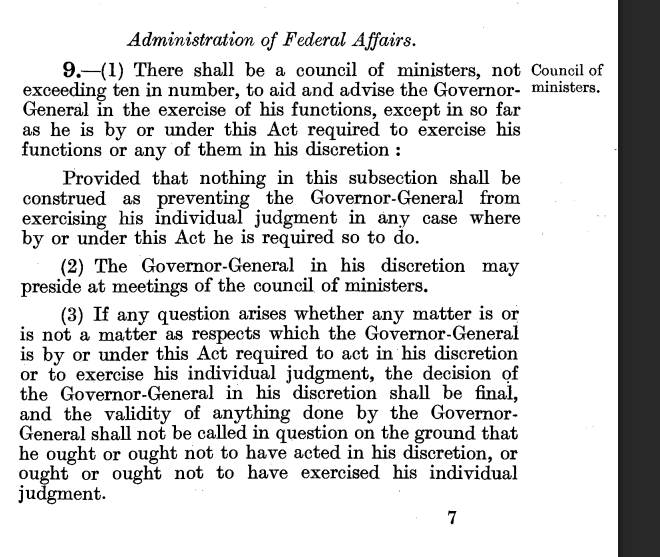
@rashtrapatibhvn SG: Union and Provincial Committee constituted.
@rashtrapatibhvn SG: BN Rau prepared Article 61- exercise of discretion by Governor General is now not there with the President. He is bound by aid and advise of the Council of Ministers.
@rashtrapatibhvn SG: reads the constituent assembly debate on this Article: constitutionofindia.net/debates/30-dec…
@rashtrapatibhvn SG says in the debate, Kamath referred to the President as 'nominal head'. But he is an elected person by way of indirect elections.
@rashtrapatibhvn J Narasimha: When President is concerned, only time when it was pending for longer was Postal Bills
@rashtrapatibhvn Hearing concludes for today.
@rashtrapatibhvn Some counsels mention about the IA.
CJI: If necessary, we will hear you.
hearing concludes.
CJI: If necessary, we will hear you.
hearing concludes.
• • •
Missing some Tweet in this thread? You can try to
force a refresh


